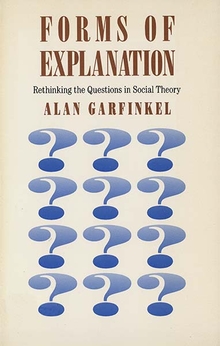Forms of Explanation
WARNING
You are viewing an older version of the Yalebooks website. Please visit out new website with more updated information and a better user experience: https://www.yalebooks.com
Rethinking the Questions in Social Theory
Alan Garfinkel
What makes one explanation better than another? How can we tell when an explanation has really answered our question? In a lively and readable discussion, Garfinkel argues that the key to understanding an explanation is to discover what question is really being answered. He then suggests criteria for a good explanation and goes on to examine some classic explanations in social and natural science.
"Garfinkel connects substantive examples and controversies in social theory with deep philosophical questions about explanation in an exciting way. His idea of explanatory relativity has deeply influenced my own thinking."—Hilary Putnam
"Always interesting and frequently brilliant."—Andrew Lugg, Canadian Journal of Philosophy
"Forms of Explanation builds an impressive case for taking structural social relations seriously."—Martin Hollis, The Journal of Philosophy
"A stimulating and cogent exercise in philosophical analysis."—Library Journal
"Garfinkel provides us with a successful blend of methodological analysis and substantive criticism. Political scientists interested in anti-positivist and anti-reductionist criticism within their own discipline will find this book a valuable contribution to the debate. The author's analysis is crisp, competent and purposeful."—William J. Meyer, Perspective
"A well-wrought argument, filled with well-chosen examples. . . . Garfinkel provides powerful critiques of reductionism, individualism in social thought, and traditional understandings of individual (biologically related) differences. His chapter, 'Individualism and Social Thought,' is the centerpiece of the book, providing a compelling critique of Nozick's atomistic individualism and Rawls's principles of allocation in the context of an excellent discussion of the overlap between explanation and justification. This discussion alone recommends this book to anyone interested in social and political theory."—Michael J. Shapiro, Social Science Quarterly
Publication Date: July 25, 1990








